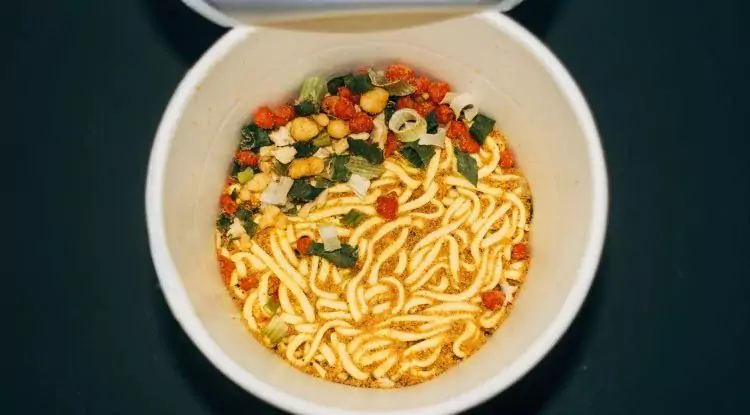The Dangers of Instant Noodles, the Most Delicious Time Bomb in the World
Who doesn't know instant noodles? This practical and delicious food turns out to be very dangerous for your health, you know.

Who doesn't know instant noodles? Everyone knows about this delicious and easy-to-make food, popular with children and adults.
Initially instant noodles were first discovered by a Japanese entrepreneur born in Taiwan, Momofuku Ando, in 1958, exactly ten years after World War II. The Japanese Ministry of Agriculture assigned him to process food from wheat. The man, who is familiarly called Ando, is thinking about what kind of food is easy to make, practical, fast, long-lasting and, delicious. Until chicken ramen was born, known as instant noodles.
Now, it's not just chicken that's on offer; a variety of flavours have emerged, ranging from vegetables, seafood, cheese and other flavours which certainly arouse the taste buds of every tongue, but unfortunately, most instant noodle connoisseurs forget about the risks that come with a package of food. This is practical and delicious.
Instant noodles are sometimes called unhealthy food because they contain very high levels of fat, salt, and especially carbohydrates but are low in vitamins, protein, fibre, and minerals. Research shows that consuming instant noodles too often is associated with poor food quality and will impact the nutrients the body needs. A Harvard School of Public Health study stated that eating two or more portions of instant noodles in one week has a high risk of developing diabetes and obesity.
Dangerous Chemicals
Apart from the nutritional content for the body, which can be said to be lacking, instant noodles also contain dangerous substances which can damage the body if consumed regularly in large quantities.
High in Sodium/Sodium
Contained in seasonings, each serving of instant noodles contains around 860 mg of sodium; the limit for sodium consumption is 2,000–2,400 mg daily. Imagine if you consumed more than one instant noodle in one day.
Preservatives / Wax and Nipagin Content
The preservation used when producing instant noodles is by deep frying (in hot oil for approximately 2 minutes at a temperature of 120 - 260 degrees until dry) to reduce water and bacteria content. The wax content coats the fried noodles so they don't stick together. Nipagin is used in soy sauce seasoning for instant noodles with RI Regulation No. 722/Menkes/Per/IX/88, with a maximum limit of 250mg/kg. Unfortunately, it is still uncertain whether the nipagin substance in instant noodles is still below the limit.
Monosodium Glutamate (MSG)
This chemical makes instant noodles more savoury, salty, sweet and sour. On the other hand, MSG poses a health risk. Excessive consumption of MSG will cause heart palpitations, dizziness, chest pain, and worsen other existing diseases.
The Impact of Consuming Instant Noodles on the Body
It cannot be denied that despite their pampering taste, instant noodles have negative impacts that can damage the body, especially when consumed excessively and frequently.
Dangers of Obesity
Obesity is one of the dangers of instant noodles. Eating instant noodles makes your stomach full quickly. It makes you hungry quickly, making you unconsciously eat more because you feel hungry again, and the high carbohydrate content is also a contributing factor.
Risk of Kidney Stones
The high salt content in instant noodles, along with large consumption, will cause salt to accumulate in the kidneys, which, can accelerate the formation of kidney stones and slowly damage them.
High blood pressure
According to research, sodium and sodium consumption can increase blood pressure and risk damage to blood vessels, resulting in a higher percentage of cardiovascular disease.
Indigestion
Instant noodles are a type of food that is difficult to digest, causing the planning system to work harder. Especially if consumed excessively.
Tips for Consuming Instant Noodles Healthily
- Adding vegetables to instant noodles such as carrots, cabbage, broccoli and other vegetables can help balance the nutrients entering the body.
- Adding protein will help add flavour to the instant noodles and add the nutrients the body needs.
- Limit instant noodle spices to reduce sodium and high sodium consumption. If instant noodles don't taste enough, adding natural flavourings such as fried onions, garlic or chilli is a good idea.
- Don't boil instant noodles in plastic or plastic containers. The chemical content in plastic can harm the body besides consuming instant noodles, which also contain chemicals.
- Set your instant noodle consumption throughout the day. The calories in a packet of instant noodles are almost the same as those in three servings of white rice. If you consume instant noodles today, you must reduce your carbohydrate intake at the next meal. Avoid eating instant noodles at night, especially before bed, as it can increase the risk of obesity and diabetes.
- Regular exercise to burn calories in the body.
These are tips for consuming instant noodles that can be applied in everyday life. Even if you follow the tips above, it is a good idea to regularly reduce your consumption of instant noodles to minimize negative impacts in the future. If necessary, consult a doctor to learn more about healthy eating patterns, even if there are difficulties or difficulties in stopping consuming too many instant noodles.
Image source: Photo of instant noodles | pexels-Markus-winkle
